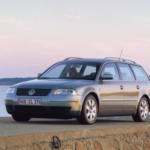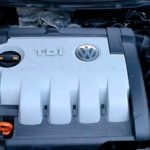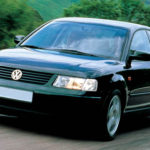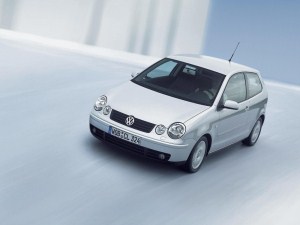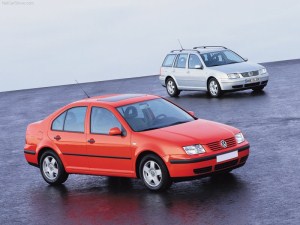Vw Passat B7 2010 - 2014 - Used, experience, breakdowns
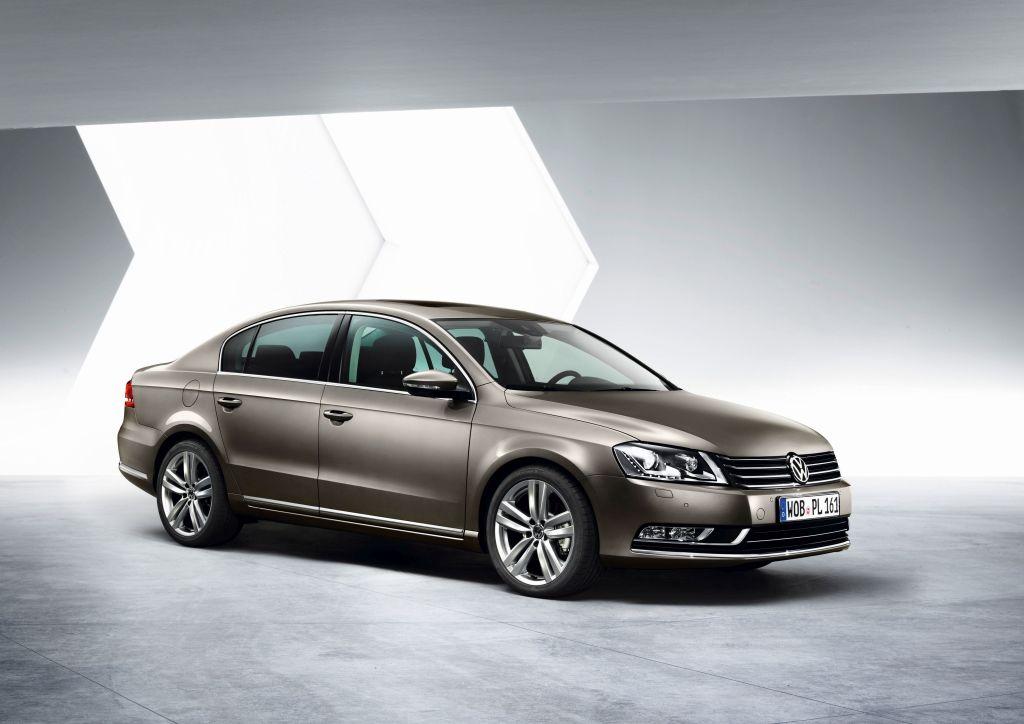
Vw Passat B7 based on its predecessor. The reason is clear, why change something that works, better said, that sells well and earns. Passat B7, dressed in a new coat, while improving some of the shortcomings. Compared to its predecessor, reliability has also been improved.
The Vw Passat B7 was presented to the public at the 2010 Paris Motor Show.
The Passat B7 underwent Euro NCAP crash tests in 2010 and received five stars.
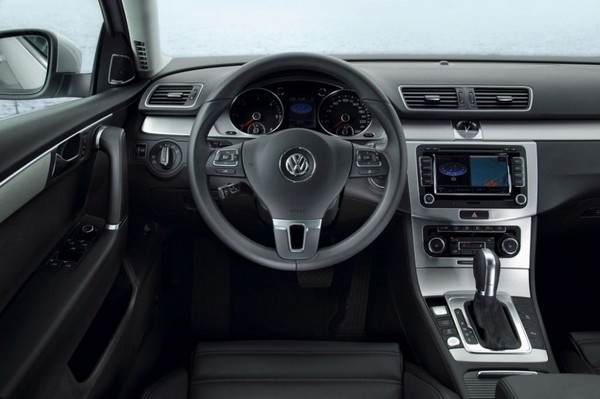
Like the body design, the interior has undergone cosmetic modifications. Some details, electronics, seats and materials used have changed. At first glance, an old, well-known interior with a modified instrument panel, a clock in the center of the dashboard or a handbrake button are pushed into the central tunnel. In more detailed examinations, of course, there are more differences.
Enjoy comfortable upholstered seats with good lateral grip even in basic equipment. There is a large range of seat adjustments and controls, which allows you to find the optimal position for different drivers. The space offer has remained unchanged, enough space for four adult travelers, where a mid-seat is only suitable for smaller people for shorter trips. The caravan variant offers over inches in the back seat a few inches extra over the conventional sedan. Internal ergonomics deserve praise.
The Passat B7 has a boot volume of 485 liters (sedan) and 513 liters (Variant).
Compared to the previous B6, the Passat B7 features sharper headlamps and taillights. A massive grill with a large logo strikes the eye. Passat has long been known for its spacious interior.
Engines - Vw Passat B7
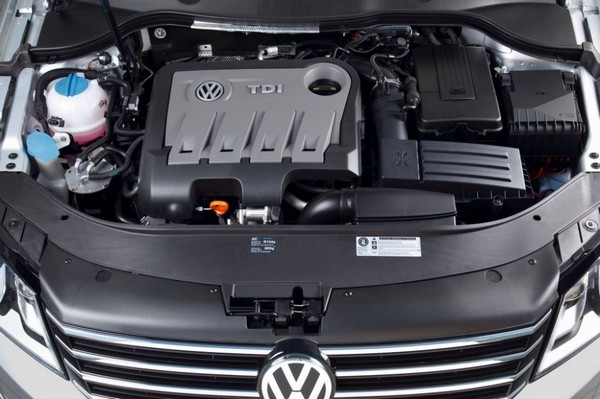
Gasoline engine - Vw Passat B7
The base gasoline is a 1.4-liter four cylinder delivering 90 kW at 5000 rpm and 200 Nm of torque between 1500-4000 rpm. The engine has a 10: 1 compression ratio, has direct fuel injection, a small turbocharger that turns up to 220.000 rpm, variable intake valve timing and 80% of maximum torque is available at 1250 rpm. In practice, the dynamics are sufficient for normal driving, the engine will satisfy good performance and the willingness to pull at lower speeds, but for faster acceleration it is necessary to keep the engine above 3000 rpm.
Vw Passat 1.4 TSI
The more powerful version of the 1.4 TSi Twincharger with 118 kW at 5800 rpm and 240 Nm of torque at 1500 rpm is equipped with a two-chamber TvinScroll turbocharger that helps the mechanical compressor to charge the engine at lower engine speeds. Up to 2400 rpm, the engine is supplemented by a mechanical compressor, at medium engine speed the turbocharger is turned on, so that up to 3500 rpm when the compressor is turned off by an electromagnetic clutch and the engine is charged only by the turbocharger. Thanks to this technology, the engine is characterized by good flexibility even at low revs and offers a constant increase in power with peak power at high revs.
Consumption of the two engines depends more on the driving style, when driving economically it falls below 7 liters, but is usually around 8 liters. However, in faster driving, it is no problem to exceed the 10 liter limit.
Vw Passat 1.8 TSI
Another available engine is the 1,8 TSi, which has a power of 118 kW at 5000 rpm and a torque of 250 Nm between 1500 and 4200 rpm. It is characterized by extremely cultivated work, good flexibility over a wide range of speeds and acceptable consumption. Consumption averages about 8,5 liters. Faster, more frequent driving around the city increases consumption by over 10 liters.
Vw Passat 2.0 TSI
A 2.0-liter turbocharged engine with direct injection is available for sporty drivers. The EA888 engine achieves 155 kW at 5300 rpm and a torque of 280 Nm between 1700-5200 rpm. Unlike the older 2.0 TSi series EA 113 (147 kW) with belt, the 2.0 TSi (155 kW) uses a chain to drive, contains a variable flow oil pump, higher fuel system pressure (150 instead of 115 bar), has a lower compression ratio 9.6: 1 (instead of 10.5: 1), and the differences are also with the pistons used, the cast iron block and the crankshaft. Compared to its predecessor, consumption has fallen by several estimates. The engine is characterized by outstanding dynamics between 2000-5000 rpm, fast response to the accelerator pedal and acceleration and interesting sound. Due to the offered performance, the consumption is also acceptable, which with a little effort is around 9 liters, however, it can be 12 liters or more in faster driving.
With the 1.8 TSi and 2.0 TSI EA 888 engines, the most common problem is a failure of the hydraulic chain tensioner. To reduce consumption and emissions, new engines are becoming more subtle, and the same goes for the drive chain. Depending on how elongated the piston of the hydraulic tensioner is, it is possible to estimate the elongation of the chain - the more the chain is stretched, the more the tensioner is pulled out. An overstretched chain is manifested with a typical rattle. The risk of skipping the chain is quite high, with fatal engine damage. The most common chain skipping is when starting or shutting down the engine. The solution is control, ie preventive replacement of the drive chain, including the problematic hydraulic chain tensioner. A new type of hydraulic chain tensioners has been available since March 2012.
Very often, in the case of TSi engines (1.8, 2.0) of the EA 888 series, excessive oil consumption occurs. This is due to the very thin piston rings and the excessive formation of carbon deposits in direct injection engines. The last wiping link on the scraping piston gradually becomes clogged with soot deposits and ceases to perform its function of scraping oil from the cylinder walls. The result is the consumption of too much oil, when the only solution is to replace the piston rings and pistons, which means a large investment. If the problem is neglected, in addition to increased consumption, there is a gradual damage to the cylinder wall from soot deposits in the wiper link channel, which means a complete overhaul (either a new semi-engine or treatment of the cylinder walls). The problem was fixed in the fall of 2011, when the manufacturer modified the pistons and replaced the narrow wiper links with a wider one.
Vw Passat 3.6 FSI
A special chapter is the six-cylinder FSI engine with direct fuel injection. It is a 3.6 FSI VR6, which reaches 220 kW at 6600 rpm and a torque of 350 Nm in the range of 2400 to 5300 rpm. The engine is characterized by cultivated driving, sound and readiness to accelerate from lower engine speeds. For a sportier ride, however, it is better to maintain speeds above 3500 rpm, with the engine going up to 7000 rpm. The consumption of six-cylinder engines is on average around 11-12 liters, and more frequent faster driving is 14 or more liters.
Diesel engine - Vw Passat B7
Unlike its predecessors, only common-rail diesel engines are under the hood of the Passat B7. The base is 1.6 TDI with a power of 77 kW and a torque of 250 Nm in the range of 1500-2500 rpm. Its sophistication and sound elimination is at the right level, the dynamics go for normal driving. Consumption is more dependent on engine load than the 1.9 TDI with the same power parameters, in practice it is around 5.5-6 liters in normal use.
Vw Passat 2.0 TDI
Dynamics and fast driving are provided by 2.0 TDI engines, available in three power versions. The base is a 2.0 TDI with a power of 103 kW and a torque of 320 Nm in the range of 1750 - 2500 rpm. It is a more powerful version 2.0 TDI with 125 kW and 350 Nm in the range 1750 - 2500 rpm, which was replaced by a revised 2.0 TDI with 130 kW and 380 Nm in the range 1750 - 2500 rpm. Engines are characterized by good agility and sound insulation, consumption averages about 6 liters.
Volkswagen also offered all-wheel drive in the Passate B7 traditionally referred to as 4Motion. The system uses 4th generation Haldex. It works based on the information from the sensor, decides the degree of shifting of the slats and therefore the amount of torque transmitted on the rear axle. Under normal grip conditions, about 90% of the torque transmitted to the front wheels in the event of poor terrain (eg snow, etc.), by properly redistributing the torque between the axles, significantly improves the towing capacity of the vehicle. In addition to better towing capabilities, it also improves driving performance and provides greater ride comfort.
Haldex will meet acceptable service costs if you change the oil after 60.000 km. Reliability is also good, of course, with reasonable handling, where the haldex and rear differential will last hundreds of thousands of miles. Excessive wear or damage will result, in particular, in towing heavy trailers or excessive off-road driving, etc. In the long run, driving with improperly inflated tires is also inconvenient because the system is relatively sensitive to the difference between the speeds of individual wheels. When buying a 4 × 4 version, it is necessary to test the actual functionality of the system or to hear a rattle from the mechanism.
Transmission - Vw Passat B7
The Passat B7 can be fitted with a six-speed manual transmission or DSG automatic transmissions. The manual transmission features easy handling, precise movement and short strokes, as well as minimal end position clearance. They are also available DSG automatic transmissions with six or seven degrees (1.4 TSi).
DSG gearboxes they can work in two modes - fully automatic or manual. The mode is selected by moving the selector to the desired position, left (automatic mode) or right (manual mode). DSG gearbox is known for its quick reaction.

The most common problems - Vw Passat B7
Volkswagen The Passat B7 has managed to correct most of the shortcomings of its predecessors, and is therefore characterized by good reliability. An increased failure rate usually occurs after 200.000 km, of course, assuming the vehicle is routinely used and properly serviced. When buying a Passat B7, you need to pay attention to the actual mileage, especially when the Passat B7 is imported. Although the vehicle looks like new, it can actually have more than 200.000 km, which means significant costs and an increased risk of various problems. If the service history is not available at the time of purchase, you must be extremely careful around the vehicle and we must not trust the seemingly low mileage on the instrument panel.
Occasionally, the Vw Passat B7 may have problems with parking sensors, air conditioning, electrically adjustable seats, windows or the original navigation system - screen failure. As far as corrosion is concerned, the vehicle is well protected, and the weak points are only the edges of the rear doors of the caravan versions, where surface rust sometimes occurs.
For vehicles with higher mileage (usually more than 200.000 km), there is play in the rear strong blocks of the front axles, which is reflected in increased noise when driving over bumps and the time of deterioration of driving characteristics. The sound of impact when passing over unevenness is due to play in the stabilizers.
When the TSI is an engine, after (about 100 to 150.000 kilometers) you often have problems with excessive stretching of the distribution chain. The problem is detected by a particularly noisy start for a few seconds, usually when the engine is cold, for example after a night of stopping, but sometimes the chain rattles even with a warm engine. Problems with the timing mechanism are detected by the flashing yellow (orange) motor light, because due to the stretched chain, the engine control electronics notices a shift between the camshaft and crankshaft synchronization. Depending on the engine, the problem is a towed chain or poor functioning of the chain tensioners. The problem of the chain tensioner should not be ignored and should be replaced with a new one, otherwise there is a risk of skipping the chain, which is a much bigger problem. It is necessary to change the complete set of distribution, ie chain, hydraulic tensioners, sprockets. The problem relates to vehicles manufactured before mid-2011 when the drive chain mechanism was modified. The problem of divorce has already been solved on many vehicles during the warranty period, on some vehicles with low mileage, it is better to replace the drive mechanism preventively (at least 100 KM is recommended). The six-cylinder 000 FSI also has problems with the noisy drive chain, the solution is to replace the drive chain mechanism.
TSI engines occasionally (especially with the first models) have a problem with a poorly functioning fuel pressure regulator or high-pressure pump - the symptoms of jerk while driving, shutting down the vehicle. Occasionally the problem in the control unit, which needs to be reprogrammed, is sometimes replaced. At higher miles there is a malfunction of the lambda probe or malfunction of the injector, which is usually reflected by the engine malfunction light, increased fuel consumption or malfunction.
In the case of the 1.4 TSI Twincharger, there is a problem with the motor containing an electromagnetic coupling for the simultaneous connection of the compressor and the water pump. In addition to the coolant leaking, it sometimes happens that the device does not connect the compressor, which leads to a loss of power. There may be problems with cracked pistons or excessive oil consumption, where the only solution is to replace the pistons, links and connecting rods. The reason for the cracked pistons is the detonation combustion of the engine and thus the increased temperature in the cylinders. The manufacturer has changed the software of the control unit over time, so that the causes of the detonation combustion problem are reduced. In case of unclear service history, it is necessary to make sure that the software of the control unit has been modified.
In the case of TSi (but also other engines), there may be an oil leak in the crankcase ventilation separator, leading to increased engine oil consumption. More often, excessive oil consumption is caused by improperly shaped and dimensioned pistons and piston rings in the case of the 1.8 TSI and 2.0 TSI (EA888). The only solution is to replace pistons, piston rings and camshafts. The change came in June 2011, when the piston group was modified by the manufacturer, which largely eliminated the frequent problems of excessive oil consumption.
With TSI engines, wear of the variable valve timing control mechanism occurs due to extremely long oil change intervals, resulting in an error message - engine control lamp light or reduced engine power, noisy and uneven engine operation.
With TSI (FSI) engines, the increase in soot production can be a consequence of the recirculation of a large amount of exhaust gases, but also the very principle of direct injection. The result is a gradual reduction in engine power, poorer operation and loss of engine power, as well as the risk of valve overheating. Soot also degrades oil quickly, which, together with long oil change intervals, contributes to faster wear of the engine (cylinders / pistons, valve mechanism) and its components (turbocharger). Therefore, it is recommended to change the oil up to a maximum of 15.000 km / 1 per year, with more demanding use of the vehicle, of course at a lower mileage. Fuel quality - from time to time add petrol with more octane (min 98), ie. add gasoline additives regularly (at least once every 3-5.000 km).
If the maintenance or service interval (oil change) over 15.000 km is neglected, the soot of the hydraulic lifters becomes clogged. This problem is gradually reflected in a decrease in engine power, uneven idling, subsequent loss of engine power, burnt out valves, wear of the camshafts and increased oil consumption. Prolonging service intervals or using unsuitable oil gradually leads to excessive wear of the drive chain mechanism - faster towing and increased noise of the timing chain (chain drive motors). In addition to more frequent oil changes (every 15.000 km), it is recommended to remove the crankcase and clean the oil pump sieve at 100.000 km. Clogging of the soot screen results in a pressure drop in the lubrication circuit which has a negative effect on the service life of the hydraulic valve lifters, turbochargers or engine drive mechanism.
Rare ignition coil failures, resulting in uneven engine operation, operation on fewer cylinders. The coil failure is usually caused by a long spark plug replacement interval, so it is recommended that the spark plugs be replaced after approximately 60.000 km.
The 1.6 TDI and 2,0 TDI sometimes have a problem with the EGR valve leaking (often at winter-freezing temperatures, especially with vehicles that often travel shorter routes) - the cooling water enters the intake, leading to a gradual loss of coolant. Coolant loss may be due to a water pump leak, which is recommended to be replaced along with the manifold, saves work and prevents unnecessary problems. Due to frequent driving on shorter distances, there is a problem with the EGR valve - the engine loses power, jerks or switches to safety mode together with the ignition of the engine failure lamp.
In the case of a 1.6 TDi engine, sometimes the light comes on, the engine goes off, the engine speed fluctuates, or we have a harder starting engine. The reason is usually the incorrect information of the air mass flow sensor that results in its replacement. However, there are often no problems and the reason may be an inappropriate air filter (best to change the original) or a defect in the temperature sensor.
For multi-kilometer TDI engines, the risk of floating flywheel problam must be accounted for, reflecting noise and excessive idling, higher acceleration noise at lower engine speeds. Higher mileage also carries the risk of overloading the turbocharger (resulting in increased oil consumption, oil intake, reduced / variable power). Turbocharging pressure control can also be a problem, resulting in reduced power, twitching and sometimes switching to safety mode.
With higher mileage and worn out injectors can be a problem. Excessive wear or failure of the injector can also be caused by the use of lower quality fuels, and it is therefore advisable to add high quality diesel fuel from time to time. Injectors are more sensitive especially with 1.6 TDi (Continental) engines. Excessive injection of the injectors results in heavier cold starts, uneven operation, or lower engine power. Poor fuel is also a cause of blockage of the control valve in common rail, the symptoms are similar to those of broken injectors.
Problems with DPF filters usually occur only at higher miles (usually over 200.000 km), and if they occasionally occur, are generally the result of longer journeys on shorter routes when there is insufficient regeneration. Regeneration is less frequent and the filter clogs faster. Of course, the engine itself, especially the injection system, EGR, turbine, cylinder heads / valves and piston / cylinder wear, also affect the life of the DPF. Sometimes the DPF's exhaust pressure (temperature) sensor can also break down. DPF filter system problems are usually reported using a light indicator, switching the engine to safety mode. The approaching end of a DPF filter is usually reported by an increased frequency of regeneration with a slight increase in average consumption.
In the case of a DSG gearbox, it is recommended that oil change intervals be monitored every 60.000 km, otherwise the hydraulic valves will become clogged gradually and problems with gear changes or a faulty gearbox will occur. DSG gearboxes always need only the original oil specified by the manufacturer, without replacement. Control electronics / mechatronics can malfunction. In the case of a test run, there must be no impact noise from the gearbox, without the instrument panel illuminating, without idling or traveling on the road.
Older models with 1.6 TDI and 2.0 TDI diesel engines have problems with leaking water pumps. The problem is the poor quality of the sealing elements.Bugs on the bodywork
There is also a problem with frequent infiltration of water into fog lights.
For wagon versions, the rear wiper will cancel.
Some owners report problematic operation of navigation units, which ‘freeze’ from time to time.
In some series, there are problems with the side window power switches.
There is often poor radio reception.
Individual problems with Start & Stop system failure. The problem is solved by changing the battery and / or reprogramming.
Service - Vw Passat B7
The timing belt should be changed as follows: 1.6 TDI and 2.0 TDi engines have intervals of 180.000 km, 1.4 TSI, 1.8 TSi and 2.0 TSI (EA888) petrol engines have so-called. maintenance-free chain. Despite the so-called maintenance-free status is recommended to preventively check the condition of the chain and replace as needed. The fuel filter has a prescribed replacement interval of 60.000 km. The Haldex clutch has this, but it is recommended to change the oil every 60.000 km. The same oil change interval is also recommended for the DSG transmission as it favors a longer service life of the clutches and mechanism. In the case of an engine oil change, a fixed service interval (QGO / QG2 code) of 30.000 km (or two years) or a Longlife variable service interval (code QG1) is available, which indicates the indicator on the instrument panel.
Engine oil for petrol engines must comply with VW 504 00 or at least 503 00. For diesel engines, VW 507 00. Despite the manufacturer's engine oil change interval, it is recommended to change the oil to a maximum of 20.000 km, but preferably every 15.000 km, after 1 years. Candles are recommended to be changed every 60.000 km on gasoline engines. Every 60.000 km, it is also advisable to check the condition of the flat belt auxiliaries.
In case of buying a vehicle with an unclear past, or with more than 150.000 km of driving, it is recommended. and especially for TSI / FSI engines, oil sump cleaning and oil pump suction vessels. A clogged oil pump suction vessel leads to lower lubrication oil flow / pressure, which has a negative effect on the hydraulic chain tensioner function - faster towing and thus increased risk of skipping and engine damage, limited hydraulic valve lifting function - accelerated valve and cylinder head wear, limited lubrication of turbochargers and the engine itself - faster wear.
Used Vw Passat B7 prices - review
Conclusion
The Volkswagen Passat B7 can be considered a successful model. This seems like a very good proposition for a family who needs a comfortable car with a large trunk. The car provides a comfortable and spacious interior, and a wide range of models will ensure optimal choice. When deciding to buy this car, we have to remember that many cars were in the fleets of the company. They should be approached very carefully because they have high mileage and you have to count on the fact that buying such a half will require a serious investment.
Recommendation of similar texts:

Hi there, I am Mladen and I am an auto enthusiast. I started this blog years ago to help like minded people share information about latest cars, car servicing ideas, used car info, exotic cars, and auto technology. You will find helpful articles and videos on a wide variety of cars - Audi, Mercedes, Toyota, Porsche, Volvo, BMW and much more. Ping us if you have anything cool to share on latest cars or on how to make older cars more efficient, or just want to say hi!

